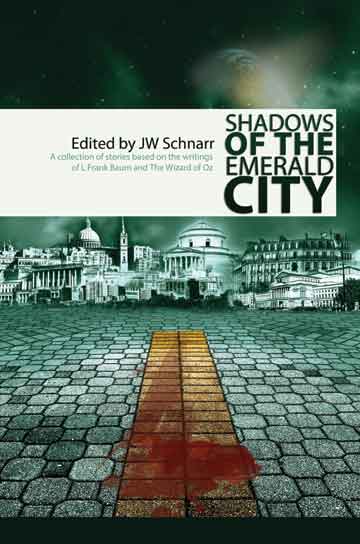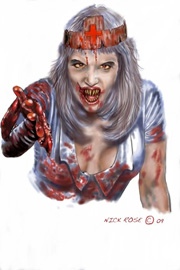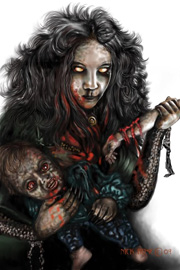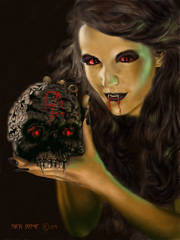 J.W. Schnarr writes horror stories from his home base of Calgary. He has been published in a variety of places, including Andromeda Spaceways Inflight Magazine, Night of the Giving Dead, and Midnight Echo, to name just a few. As if that wouldn’t keep him busy enough, he is also the evil mastermind behind Northern Frights Publishing, an Indie publisher specializing in small market genre fiction and non-fiction. Hot off the press: Shadows of the Emerald City, an anthology of horror short stories related to The Wizard of Oz. The anthology has experienced a slight delay in release date, but will hopefully be available on Amazon in the next day or two.
J.W. Schnarr writes horror stories from his home base of Calgary. He has been published in a variety of places, including Andromeda Spaceways Inflight Magazine, Night of the Giving Dead, and Midnight Echo, to name just a few. As if that wouldn’t keep him busy enough, he is also the evil mastermind behind Northern Frights Publishing, an Indie publisher specializing in small market genre fiction and non-fiction. Hot off the press: Shadows of the Emerald City, an anthology of horror short stories related to The Wizard of Oz. The anthology has experienced a slight delay in release date, but will hopefully be available on Amazon in the next day or two.
If you’re not sure if you want to read the anthology, check out the reviews so far:
Apex rates it as 5 stars, and says she liked every story, a rare thing indeed.
Senses Five mentions my story, “The Utility of Love” as the first of the must-reads in the antho.
Wanderings Magazine also mentions my story as a standout.
Innsmouth Free Press.
Strange, Weird, and Wonderful (it’s a ways down the PDF)
You can follow Mr. Schnarr through his blog. To find out more about Northern Frights Press, visit their website or become a fan on Facebook.
David Steffen: Shadows of the Emerald City is the first anthology Northern Frights has published. Â If you had to do it all over again, what would you do differently?
JW Schnarr: There are a TON of things I would do differently. This has been a huge learning curve for me. We had issues with software, contracts, correspondance, editing…the list goes on and on. I knew it was going to be like this though, and I got some great advice from A.P. Fuchs at Coscom Entertainment and Jacob Kier at Permuted Press. The ultimate goal for this anthology was to put out a book people would be interested in reading while ironing out the dozens of little hitches and problems that pop up during the birthing process.
David: What kinds of unique challenges has small press publishing provided?
JW: For me, most of those challenges came on the business end of things. I’m also flying pretty much solo, as I think a lot of Indies are. That creates all kind of challenges with the work needed to put a book together. It seemed never ending for about two months…and then one day I looked up and realized I could see the finish line. Also, trying to put a marketing plan together on a budget has been a challenge. I imagine all Indie publishers have similar challenges facing them: the biggest one is simply cutting through the glut of books being published to reach our audience.
David: Since NFP doesn’t have a huge marketing department, how have you market it?
JW: I’ve been doing a bit of viral marketing through social networking sites, and keeping discussions going in places like facebook and on forums. A large part of my plan has been reviews, and getting the word out that way. I think reviews are a really helpful marketing tool because it exposes people to the books while giving them in depth information and honest opinions on whether the book is worth finding or not.
David: How did the submissions for Shadows of the Emerald City compare with your expectations, in quantity, quality, subject material?
JW: Well, first off, there was a lot more porn in my inbox than usual. I had a bunch of submissions where writers had turned poor Dorothy into a sexual deviant…of all persuasions. It was really entertaining, but many of the stories fell short in just one or two little things and were swept away by more rounded tales.
I really had a lot more content than I thought we were going to get as well–I guess the subject matter set off a lot of matches in people’s heads. In the end, I had over 70 stories to choose from, all good, but unfortunately not all could make it. It really surpassed my expecations on all fronts, as far as quality, quantity, AND subject material.
David: How did you choose the theme? Why the Wizard of Oz?
JW: You know, I can’t say for certain when exactly I decided on this theme. The idea had been bouncing around for a little while, but I didn’t know all the ins and outs of Public Domain use until I really started researching. At one point I was actually deciding on whether to try this with Alice in Wonderland instead, but with the movie coming out I was kind of worried that the book would get snowed under and lost amidst all the hype of the movie.
NFP Anthologies are all going to be themed, and I really think an entertaining niche can be filled by letting writers explore the worlds of some of the most influential minds in the last hundred years or so. And hopefully some people went back and read some of Baum’s work in the process of creating new parts to his world. From the subject matter and responses I got, I know they did. Other publishers may be doing Zombies…We’re going a step further and bringing dead authors back to life.
David: Why did you start Northern Frights Press? What are your goals for NFP?
JW: NFP has its roots in a business plan I made up about a year ago to publish and market my own books. At some point I realized that I could easily turn the project into an Indie Press, something I’ve wanted to do since I was in high school. I love writing, but in College I realized I also loved editing and publishing as well. This has been a perfect mix for me, and allowed me to justify spending all that money on college getting a journalism arts diploma.
My goals for NFP center around a two year business plan where I’ll be growing our product base and getting the word out with new anthologies, novels, and electronic release in the coming months. NFP is going to continue to refine the publishing process, put out quality work from quality writers, and hopefully become a presence in the convention scene at some point. if, along the way, I can earn enough money to take a day off or two from drywalling, well, then it will have all been worth it.
David: After Shadows, what next? What’s the next theme?
JW: The next two themes are actually linked. Both are taken from classic science fiction written by the great H.G. Wells–War of the Worlds, and The Time Machine. I’ve gotten Artist Gavro Krackovic back to do these covers (he did the cover for Shadows of the Emerald City) and we’re currently exploring some ideas on how the books should look. I’m giving him the full covers to work with this time, so expect something amazing, front and back.
War of the Worlds: Front Lines will have a harder sci-fi/horror edge to it and focus on the wars between humanity and alien forces…not just the H.G. Wells aliens, but all aliens. And the stories will hopefully take place on as many different fronts and battlefields as can be imagined.
Timelines: Stories Inspired by H.G. Well’s The Time Machine is going to be a softer science fiction collection. I’m picturing dark, moody or introspective pieces, as well as the kind of horror that sneaks up on you. Hopefully these two books will compliment each other in style, and the covers will reflect that.
David: At what point in your life did you realize you wanted to be a writer?
JW: I was very young when I started writing. However it wasn’t until I was 12 or 13 that something happened that made me start thinking seriously about a life as a writer. We were doing a writing assignment in English class, and I remember I wrote some little thing about a monster hiding in a row of bushes that attacks a boy dropping his date off at her home. The teacher made me read it to the class, and just as I reached the part of the story where the creature reached out and grabbed the kid by the throat my teacher roared and scared the living piss out of the entire class. When I looked up, among all the babble and excited laughing there was this underlying realization that I actually had their attention, and they understood what I was trying to convey. This is a classic reader/author relationship of course, but at the time it was all new to me. I was hooked right there.
David: If you had one piece of advice to give aspiring writers, what would it be?
JW: READ!!! Read everything you can get your hands on. I have met too many writers who say they have no time for reading and can’t understand why their work isn’t growing the way it should. Honestly how can you expect to write well if you never read? Would you expect a musician who never listened to a note of music to be able to compose? Every published story and novel out there has a little blueprint in it for publishing your own stories and novels. Learn from those who have come and gone before you. Eventually you’ll start seeing the successful things they did with their work and be able to apply those things to your own.
David: What was the last book you read?
JW: At the moment I’m digging through The Encyclopedia of Mass Murder (research for my novel) but recently I read The Time Traveler’s Wife and it was fantastic. I don’t usually go for love stories, but there was enough science fiction in there to keep things interesting. I’ve been on a bit of a literary kick this year, stepping out of my more familiar stomping grounds of horror and golden age sci fi and picking up things like The Life of Pi and The Kite Runner. maybe I’m just turning into a suck.
David: Your favorite book?
JW: Tough call. I am Legend or The Hellbound Heart maybe, though both were novellas. My favourite book for years was Blue World by Robert R. MacCammon, but I’d feel like a traitor if I didn’t include a Stephen King or Poppy Z. Brite novel. There are so many good ones, it’s really too hard to decide on one.
David: Who is your favorite author?
JW: See answer above. Can I make a list? If so, it goes like this, in no order: Clive Barker, Richard Matheson, Poppy Z. Brite, Stephen King, Ray Bradbury, H.P. Lovecraft, Robert R. MacCammon. Right below this unholy alliance of writers there are probably several hundred waiting in the wings to take over a top spot.
David: What was the last movie you saw?
JW: Transformers 2! there’s a cheapo theater right by my house that shows movies like a month or two before they hit the video shelves, and for 20 bucks we can get movie passes, popcorn, and drinks…and she gets skittles. The theater is a grungy little thing that attracts all kinds of unsavoury people, but it has a feel to it that you can’t get anywhere else except in Forest Lawn, Calgary. Anyway, I thought the movie was alright, I tried not to think about the plot too much and focused on the robots instead.
As for recent DVDs I’ve watched, I picked up used copies of The Unborn and Last House on the Left…I probably could have spent my money better elsewhere. I was looking forward to Last House, but I watched the unrated version and the five hour long rape scene in the middle of the movie really pissed me off to the point where I didn’t really care what happened to anyone after that. Seriously when did that become entertainment? The Unborn was kind of fun…Monster and I made a game of picking out the continuity errors, and there seemed to be a lot of them.
David: What is your favorite movie?
JW: Conan the Barbarian. I can recite the entire movie line for line. I can even drop the music ques and horse/sword noises, if you want. I’ve probably watched it 200 times. People think it’s cheesey but it really captured a great feel for Howard’s writing…it’s moody and bleak, and enough blood gets spilled to fill a swimming pool. Plus, James Earl Jones as a Demigod in control of a doomsday cult? That’s two words: Awe. SOME!!!
David: Do you have any upcoming publications?
JW: Well the ones mentioned already are coming out in the next few months. Shadows and Light (Pill Hill Press) is out already I believe, and ASIM and Midnight Echo are both October issues, so those should be right around the corner if they’re not out yet. As work on Shadows of the Emerald City intensified I was kind of forced to put my short stories on hold, but there will be more coming soon! I promise!
David: Can you tell us about any works in progress?
JW: Currently I have two projects on the go. I’m working on a novel called Alice and Dorothy that answers the question: What if Alice Pleasance and Dorothy Gale were two real people who met and fell in love in a mental institution? It was originally my cast off idea for Shadows of the Emerald City and I realized I could tell the story as like a rock n’ roll style highway novel with lots of drugs, shooting and hot lesbian sex. I’m also putting together a short story collection of mostly previously published work. I’ll be adding some new stories of course, and those will both be on the ground running in the Spring of 2010.
David: Thank you for taking the time to answer some questions, JW.
JW: Anytime! Remember kids: Support Indie Press! Show some love so we can continue to love you back!
 We performed our super-secret giveaway ceremony. I can’t tell you too much, but it involves both names and hats. And we can now declare a winner!
We performed our super-secret giveaway ceremony. I can’t tell you too much, but it involves both names and hats. And we can now declare a winner!
 Nick Rose is a talented horror illustrator with publications in several Horror publications including
Nick Rose is a talented horror illustrator with publications in several Horror publications including 



 J.W. Schnarr writes horror stories from his home base of Calgary. He has been published in a variety of places, including Andromeda Spaceways Inflight Magazine, Night of the Giving Dead, and Midnight Echo, to name just a few. As if that wouldn’t keep him busy enough, he is also the evil mastermind behind Northern Frights Publishing, an Indie publisher specializing in small market genre fiction and non-fiction. Hot off the press: Shadows of the Emerald City, an anthology of horror short stories related to The Wizard of Oz. The anthology has experienced a slight delay in release date, but will hopefully be available on Amazon in the next day or two.
J.W. Schnarr writes horror stories from his home base of Calgary. He has been published in a variety of places, including Andromeda Spaceways Inflight Magazine, Night of the Giving Dead, and Midnight Echo, to name just a few. As if that wouldn’t keep him busy enough, he is also the evil mastermind behind Northern Frights Publishing, an Indie publisher specializing in small market genre fiction and non-fiction. Hot off the press: Shadows of the Emerald City, an anthology of horror short stories related to The Wizard of Oz. The anthology has experienced a slight delay in release date, but will hopefully be available on Amazon in the next day or two.